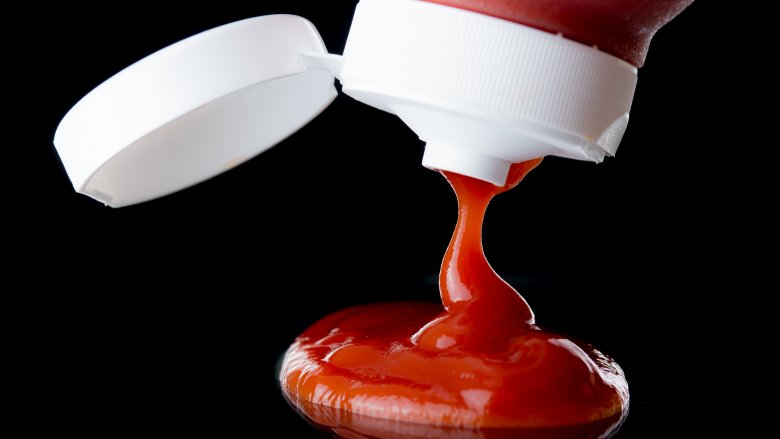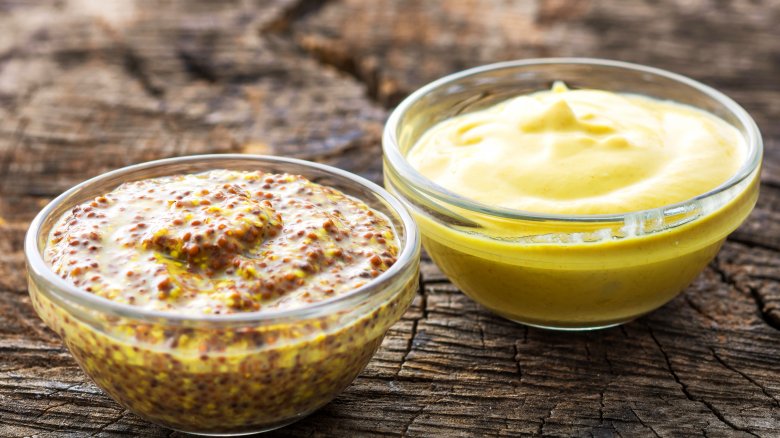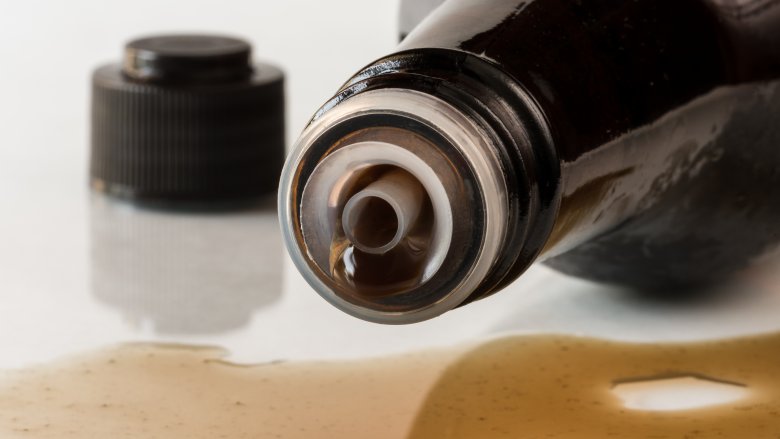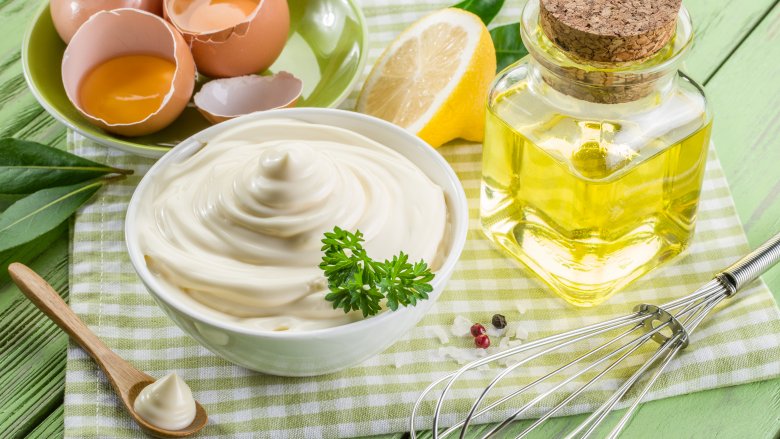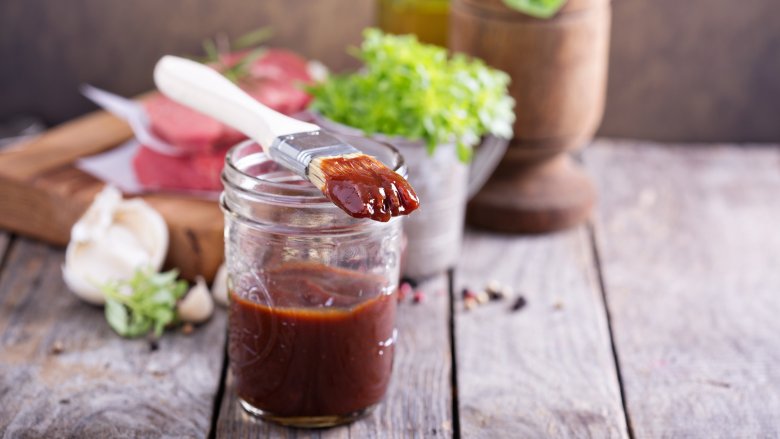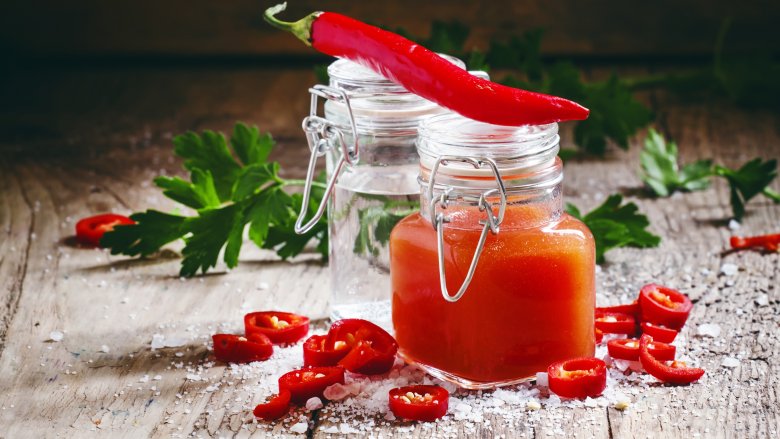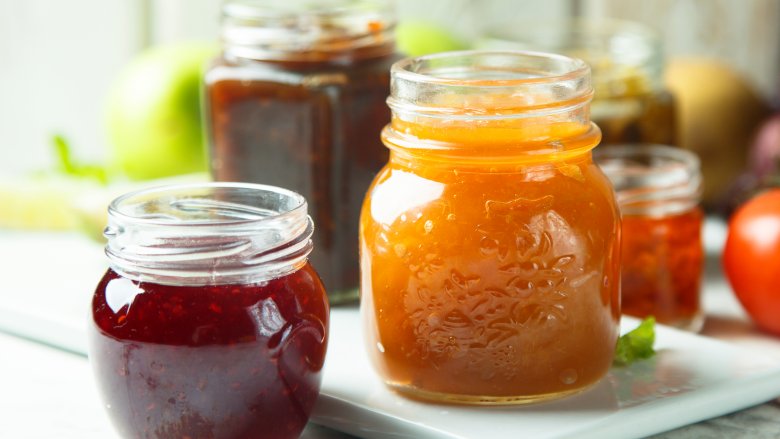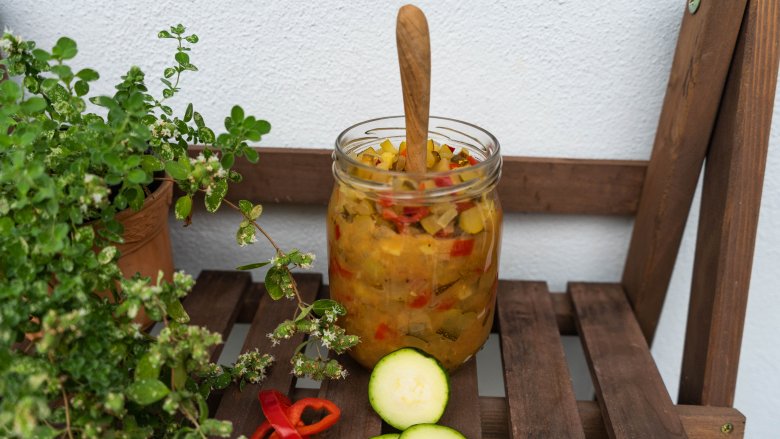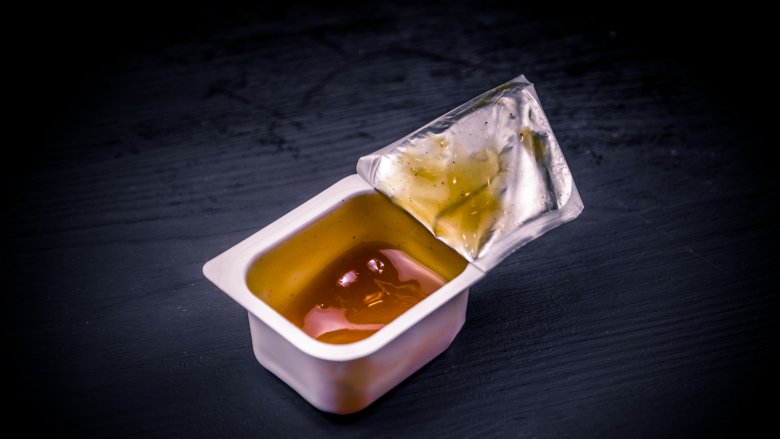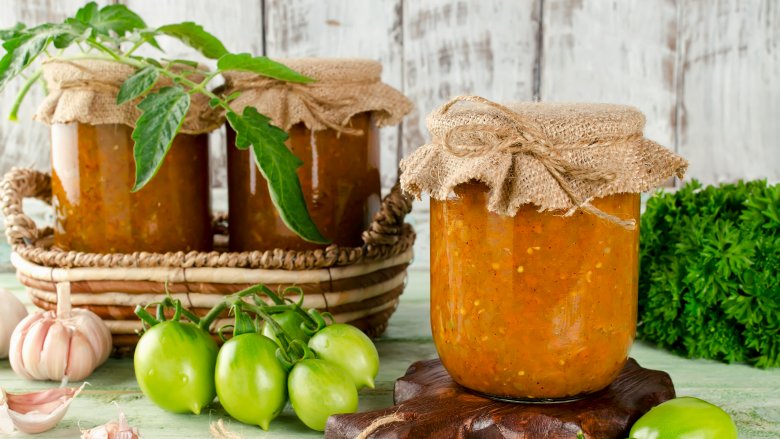The Truth About How Long Condiments Really Last In Your Fridge
It doesn't matter how diligent we are of keeping track of what's in the fridge, we've all been there. There are always those few mystery bottles tucked away in the back, the ones you forget about until you're rummaging through for something else.
The ketchup you opened for that cookout months ago. The BBQ sauce you used for that potluck. That fancy German mustard you picked up around Oktoberfest... and haven't looked at since.
You crack open the bottle, give it the sniff test, maybe even pour some out. It looks fine, but it's old. Is it still good, or are you going to regret using it again? Sure, they're just condiments, but look at it this way. Food waste is a huge problem, and it's all money that's just being thrown away. You should be getting the most out of everything you buy, so let's talk about just how long these staple condiments are going to last.
The great ketchup debate
There's a huge disagreement over whether an opened bottle of ketchup should be kept on the shelf or in the fridge, and we're betting you didn't even know the other side of the debate existed. Heathens!
Social media had a meltdown in 2017 over just this issue, says Today, and according to Heinz, the acidity of ketchup technically makes it shelf-stable, but once you open it, it can impact the balance of what's inside. They recommend keeping it in the fridge once you've cracked the seal, so that's one thing settled.
So, how long do you have to use that bottle? Still Tasty says your opened and refrigerated bottle will be good for between nine to 12 months (and for comparison, that same bottle will only last about a month if you're the pantry sort). It might change color a bit, but generally, it's fine.
While we're on the subject, let's talk about the ketchup-based cocktail sauce. That's actually not going to last quite as long, but should be good for between six and nine months after you open it, as long as you store it in the fridge. In other words, use the bottle you opened for New Year's Eve by June, and you're fine.
Mustard
Here's where things get a little tricky. According to French's, it's not technically necessary to refrigerate your regular mustard, but they say popping it in the fridge will help it hold flavor. When it comes to horseradish-based and Dijon mustards, they say you should definitely put those in the fridge. While there's nothing in either that will spoil, they will lose flavor if they're not kept cold and even though it's technically fine to eat, you might not want to.
They also say that how long it lasts depends on the container. Mustard in a glass jar will last much longer than the stuff in the squeeze bottle, so families that don't use too much mustard should definitely opt for the jars. French's says their general rule is that mustard will still be good for two to three months (depending on the container) beyond the "Best By" date, which they stress isn't an expiration date at all. Unopened shelf life of bottled mustard is 18 months, but jarred mustard will last up to 24 months.
Worcestershire and soy sauce
Here's another one that's a little tricky, starting with just how we store these. Take Worcestershire sauce. It's been a staple in kitchens for decades before most families even had fridges, says the BBC, and it's fine for a long time just sitting on the shelf.
But food experts also note that as our homes got warmer, we became much more accustomed to keeping opened bottles of things in the fridge. So, if you keep your Worcestershire sauce in the fridge, you're not wrong. According to Still Tasty, you're actually prolonging the life of the product by keeping it refrigerated. As long as it's been consistently kept cold, it'll last up to three years.
While we're talking about long-lasting condiments, let's talk about soy sauce. Like Worcestershire sauce, soy sauce is fermented and that helps make it last longer. Still Tasty says proper refrigeration makes a huge difference here, too. At room temperature, your bottle will last about six months. In the fridge, though, it'll be good for around two years.
Mayo and salad dressings
No condiment is as polarizing as mayonnaise. It's definitely a love-hate sort of thing, and since there's probably at least one person in your house that doesn't like it, it likely sits on the door of the fridge for a long, long time.
How long should it stay there? According to Cherry Creek Nutrition, an opened and refrigerated jar of mayo is only good for about two months. In other words, finish that jar of mayo you opened for your backyard, summertime cookouts by the time school is in full swing.
Since mayo is a common ingredient in salad dressings, let's talk about how long these should sit. Cherry Creek also says that mayo- and cream-based dressings should only sit in the fridge for a maximum of two months once they've been opened, but you're better off using it within a month. If it's a vinaigrette dressing, you have a little more time — those open bottles tend to be good for about three months in the fridge.
Barbecue sauce
This one's a little tricky, too, because not all barbecue sauce is created equal. There are a lot of different ingredients that can go into a good BBQ sauce, so let's talk about some general tips.
Since a lot of the standard ingredients — like salt and vinegar — act as preservatives, that's good news. It means it'll last longer than you might think. Amazing Ribs says that even if you keep your sauce in the fridge, proper storage also means not letting it sit out, say, alongside the grill while you're cooking. That's going to shorten the life of the sauce immensely.
That said, let's assume you've kept it in the fridge most of the time it's been open. There's still a huge variance here. Sweet Baby Ray's says an open bottle of their sauce won't be good past the four4-month mark, but Eat By Date says some sauces can last up to a year in the fridge. That's pretty vague, so the best thing to do is use your judgement. Moldy sauce should definitely be thrown away, and you should also toss it if it looks darker or thicker then it was when you first opened the bottle.
Hot sauce
Hot sauce is a tricky one, and that's because the two main ingredients — chiles and vinegar — are preserving agents, but not all hot sauces are made the same way in the same ratios. Pepper Scale says that basic hot sauces have pretty good antibacterial qualities, but the more ingredients you start adding, the more you're going to change your shelf life.
Still, as long as you properly fridge your sauce, they say an opened bottle could be good for up to three years. Some signs of spoilage in other condiments — like a darkening color — aren't necessarily signs your hot sauce is bad, either... but, there's a "but."
Dr. Doug Archer from the University of Florida says (via Cooking Light) that you shouldn't keep that open bottle in the fridge for more than a year. That's because one of the signs your hot sauce is spoiling is that it starts to develop tiny black flecks. Those flecks are mold, and in some cases, they can react with the ingredients to start producing gases that will eventually — if forgotten about long enough — burst the container they're in. So, there's that to consider.
Jellies, marmalades, and jams
When it comes to your favorite toast toppings, they're not all going to last the same amount of time in the fridge — and here's why.
How long jams, jellies, fruit butters, and marmalades last varies by how much sugar is in them. Jams and preserves have the highest amount of sugar (as much as 50 percent), so they're going to last the longest — about a year, according to Eat By Date. Jelly tends to be made with less sugar but also has fruit juice in it, so it's going to last about the same amount of time. Marmalades are also good for around a year.
When you start looking at your fruit butters, though, there's little or no sugar there and that means they're going to only last about two to three months in the fridge. And the one that are going to go bad the fastest are the fruit curds. Since those are made with butter and eggs, they're only good for a month or two after they're opened.
It's also worth noting that since sugar is the main preservative here, sugar-free versions of jams and jellies are going to spoil a lot faster than full-sugar versions — they're only good for between six and nine months.
Relishes and chutney
Relishes and chutney might seem super similar, but here's the weird thing: when it comes to how long they're going to last in the fridge, they're at almost opposite ends of the spectrum.
They're very similar in idea, certainly, but Still Tasty says that relish — including hot dog and hamburger relish, pickle relish, and piccalilli — will stay not just safe to eat but pretty much fresh for up to a year after opening the jar, as long as it's properly stored in the fridge. Even if the color or texture changes, they say it's still safe to eat as long as there's no funny smell or signs of mold.
Chutney, on the other hand, will only last for about two months. So if you're looking for the perfect sandwich topping, maybe reach for that old jar of chutney before pulling out the relish. The clock is ticking, after all.
And what about those little packets?
If you've ever ordered takeout or stopped at a fast food joint, you probably have a collection of those little packets of condiments. They're a fairly new invention — Atlas Obscura says they've only been around since little packets of soy sauce started getting manufactured in the 1950s. They also say Heinz sells about 11 billion a year, so chances are good you've got at least a handful.
But, do they go bad? Yes.
Here's the scoop. Ketchup packets are good for around seven months, while mayo (regular and fat-free), tartar sauce, horseradish, and Tabasco packets are good for eight months. Then, you've got relish, barbecue sauce, mustard, steak sauce, and cocktail sauce packets, which will last around nine months.
And here's the weird thing. While mild taco sauce packets will last up to nine months, the same hot taco sauce is only going to be for around four. Now you know, and now, you're going to go empty your fridge drawers, aren't you?
The easy way to make homemade condiments last longer
If you make your own homemade condiments, their time in the fridge might be slightly more limited than products that are produced in a sterile and commercial environment. But according to nutritional therapist Margaret Floyd (via Eating Rules), there's one ingredient you can add to your homemade condiments to extend their usefulness for weeks and, in some cases, months.
What is this magical ingredient? Cultured whey.
When you get a tub of plain yogurt and you let it sit in the fridge for a while, you've probably noticed it separates and forms a layer of liquid on the top. That's whey. Strain it, pop it in the fridge, and add four tablespoons when you're making your condiments. That will add some good bacteria (that's also good for you), and it'll help prolong the fridge life of your condiments. Brilliant, right? So many store-bought condiments are so bad for you, now you have another reason to make your own.

